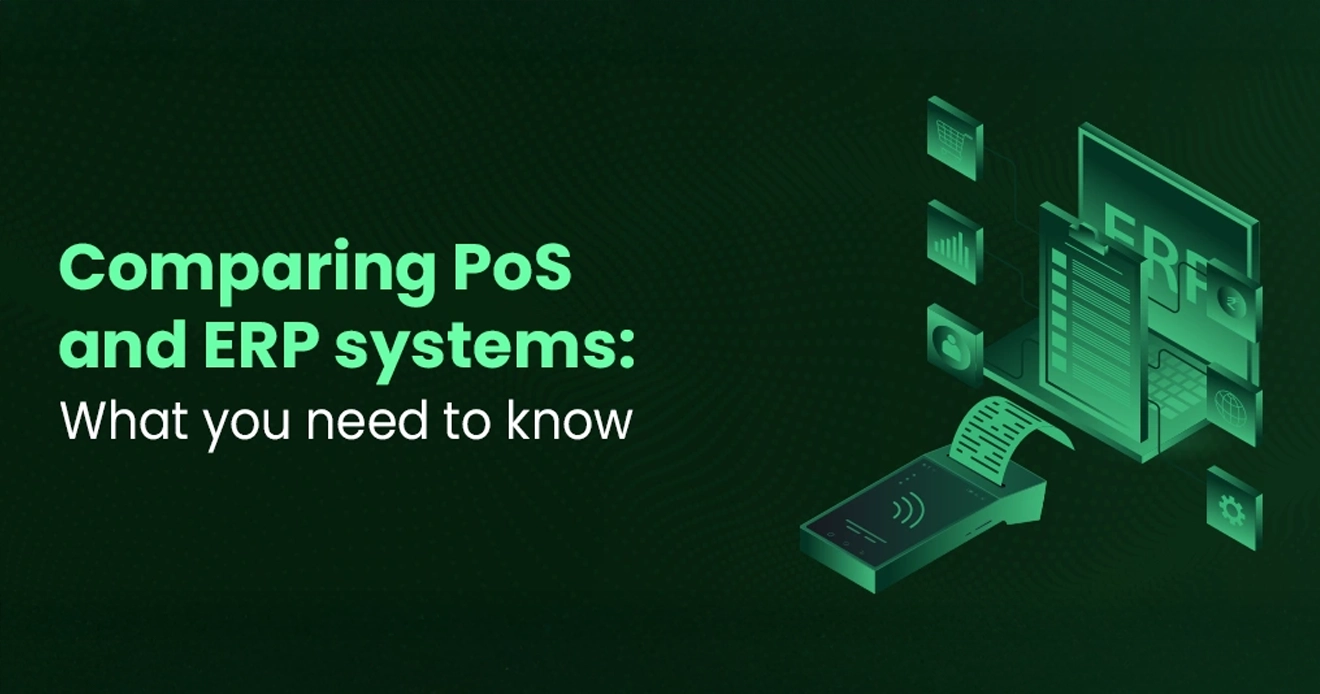According to a recent report by Statista, the PoS terminal market size will be worth 15 billion USD more by 2029 than in 2024. Similarly, the ERP software market was estimated to be 784 billion U.S. dollars in 2022, according to another report by Statista. These figures highlight the growing importance of PoS and ERP systems in modern business operations.
Two systems that often come into discussion are Point-of-Sale (PoS) systems and Enterprise Resource Planning (ERP) systems. Both play an important role in managing business operations, but they serve distinct purposes and offer different functionalities. Understanding the basic difference between PoS and ERP systems is crucial for businesses aiming to streamline their processes and improve efficiency.
In this blog, you’ll learn the answer to the question ‘PoS vs ERP’, how they are separate from each other, and other factors.
What is a (PoS) system?
A PoS (Point-of-Sale) system is used in retail environments to handle sales transactions. When a customer buys something, the transaction is processed in the PoS system. This system involves types of equipment like cash registers, barcode scanners, and receipt printers, as well as software that manages sales data, inventory, and customer information.
Key features of PoS systems
The top key features of the PoS system are:
- Sales processing: PoS systems manage the entire sales process, from scanning the products to processing payments and making receipts.
- Inventory management: They track inventory levels in real-time, alerting businesses when stock is low and helping to prevent overstocking.
- Customer management: PoS systems store customer data, enabling businesses to track buying behaviors and provide personalized services.
- Reporting and analytics: They offer detailed sales reports and analytics, helping businesses make informed decisions.
What is an (ERP) system?
Enterprise Resource Planning or (ERP) system is a comprehensive software platform used to manage and integrate a business’s core processes. Unlike PoS systems, ERP systems are designed to handle a variety of business functions beyond sales, including finance, HR, supply chain, manufacturing, and so on.
Key features of ERP systems
The top key features of the ERP system are:
- Integrated management: ERP systems incorporate various business processes into a single system, ensuring smooth data flow across departments.
- Finance and accounting: They manage all financial transactions, including accounts payable, accounts receivable, the general ledger, and payroll.
- Human resources: ERP systems manage HR functions like recruitment, employee management, payroll, and performance evaluation.
- Manufacturing: ERP systems handle manufacturing processes, including production planning, scheduling, and quality control.
Comparing PoS vs ERP systems
When comparing PoS and ERP systems, it’s important to understand that they perform according to different business needs. Hence, you can consider the following factors to compare both:
- Implementation and cost
- PoS systems: They are generally easier and quicker to implement, and their cost is often lower, making them perfect for small to medium-sized businesses.
- ERP system: Due to their complexity, implementation can be more time-consuming and expensive. They are typically used by larger businesses with more intricate operational needs.
- Data management
- PoS systems: Deals with the data related to sales, inventory, and customers. The data is often used to enhance sales strategies and inventory management.
- ERP system: These systems handle a vast amount of data across various departments. This data is used to optimize overall business operations and enhance efficiency.
- Scalability
- PoS systems: While they can control significant amounts of transactions, their scalability is limited to retail operations.
- ERP system: Highly scalable and can grow with the business. They can accommodate new departments, processes, and locations as the business increases.
Integration difference between PoS and ERP
While PoS and ERP systems provide different purposes, integrating them can offer significant advantages. Integration leads to a seamless flow of information between sales and other business functions, creating a more cohesive and efficient operation.
Integrating PoS and ERP systems provides significant advantages, such as:
- Improved data accuracy: With integrated systems, data is entered once and used across multiple platforms, lowering the risk of errors and inconsistencies.
- Real-time insights: You can get actual-time insights into your business operations, from sales performance to inventory levels to financial status.
- Improved customer experience: Integration enables businesses to offer a more personalized and responsive customer experience by giving them access to comprehensive customer data.
- Streamlined operations: Processes are streamlined, minimizing manual work and increasing overall efficiency.
Choosing the right system for your business
When deciding between a PoS vs ERP system, you must consider your specific needs, size, and growth potential.
- Small to medium-sized businesses: A PoS system may prove sufficient for businesses primarily focused on retail sales. They provide the essential tools needed to manage sales and inventory effectively.
- Larger enterprises: An ERP system is more suitable for businesses with complex operations that span multiple departments. Its comprehensive nature can help control and optimize every aspect of the business.
- Enhancing business efficiency: The PoS vs ERP decision
- In the debate of PoS vs ERP systems, there is no one-size-fits-all answer. Each system provides distinctive advantages personalized according to different business requirements. PoS systems are proficient in handling retail transactions and customer interactions, making them perfect for businesses focused on sales. Whereas ERP systems offer an integrated approach to managing all business functions, offering a more holistic solution for larger enterprises with diverse needs.
- Learn about Pine Labs PoS systems at : https://www.pinelabs.com/.

